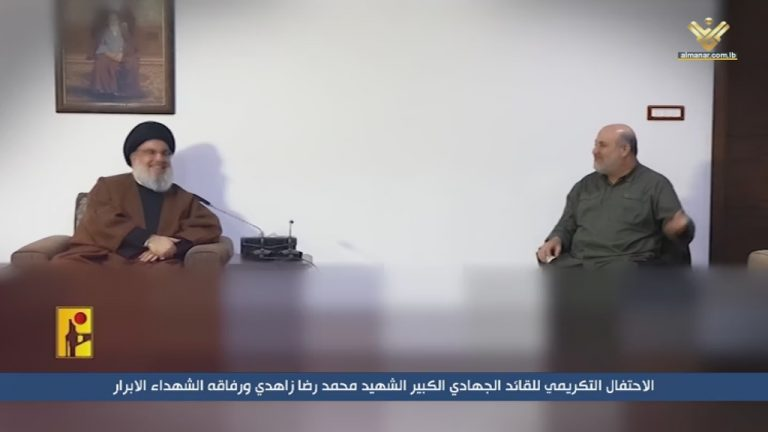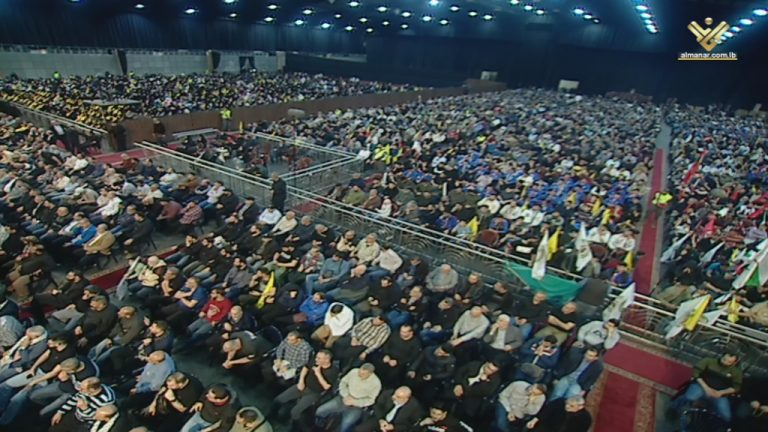Lebanon – Live News – News – S. Nasrallah Speeches – Top – Videos
Mohammad Salami
Hezbollah Secretary General Sayyed Hasan Nasrallah stressed on Monday that the Israeli folly of striking the Iranian consulate in Damascus and assassinating the top military advisor General Mohammad Reda Zahedi and his martyred companions pushed the US President Joe Biden to impose certain limits on Netanyahu’s adventure in Gaza.
Sayyed Nasrallah maintained that the Supreme Leader Imam Sayyed Ali Khamenei took the decision of the military response upon the serious essence of the Israeli attack.
Sayyed Nasrallah cited Zionist analysts as describing the airstrike on the consulate as a major folly, adding that the Israeli officials may have fallen in the miscalculation that Iran would not respond.
US, ‘Israel’ and the whole world have yielded to the fact that Iran has the right to respond to the Zionist crime and will respond, Hezbollah Chief said.
In this regard, Sayyed Nasrallah explained the nature of the Iranian military role in Syria, confirming that only advisors are deployed in order to carry out certain missions and denying the deployment of troops.
His eminence added that the IRGC military advisors in Syria have been always targeted by the Israeli air raids aimed at expelling them and eradicating their role in that country.
Upon the defeat of the terrorist groups in Syria, the Israeli air raids started targeting IRGC cadres and advisors; however, they (Iranian military advisors) have insisted on keeping in Syria in order to support the resistance in Lebanon and Palestine and the Syrian army in its battle against the takfiri organizations, according to Sayyed Nasrallah.
Sayyed Nasrallah noted that all the diplomatic missions in the world include military attaches and advisors, yet that the Israeli enemy tried to promote the false claim of striking Iranian troops in Syria.
One of the Gulf states provided Saddam Hussein with 200 billion dollars to fund his war on Iran, Sayyed Nasrallah said, adding that, had such an amount of money been granted to the serious resistance groups, ‘Israel’ would not be in existence nowadays.
As the Zionist invasion stopped, most of the Iranian forces returned home, yet IRGC cadres remained in Lebanon to train the resistance fighters, Sayyed Nasrallah said, adding that IRGC sacrificed martyrs in Zionist airstrikes on training camps in Bekaa and Syria.
The need of the popular resistance to face the the Zionist enemy made the IRGC cadres train the fighters, provide consultations, grant the logistical support, and convey the expertise to all the resistance groups, according to Sayyed Nasrallah who confirmed that the IRGC advisors were not tasked with fighting the Israeli enemy in the battlefields.
Even upon the eruption of the crisis in Syria, Iran sent military advisors, not troops, Sayyed Nasrallah said, adding that only resistance groups in the region decided to support Syria in face of the terrorist groups.
‘Israel’ participated in the war in Syria through supporting the terrorist groups by all means, according to Sayyed Nasrallah who recalled the Zionist financial, medical, and military support to takfiri groups.
Sayyed Nasrallah also denied the false claims that Iran controls the government in Syria, stressing that the IRGC advisors have just supported Syria against the terrorist groups.
Martyr Zahedi
In his twenties, Hajj Zahedi was one of the warriors against Saddam Hussein’s war and gained a great military expertise, which enabled him to be promoted to high ranks, according to Sayyed Nasrallah.
Hajj Zahedi became the commander of the IRGC airforce before turning to be the commander of the IRGC ground troops, Sayyed Nasrallah said, adding that the martyr was then promoted to be the commander of all IRGC operations.
Sayyed Nasrallah indicated that Hajj Zahedi started his jihadi journey when General Qassem Suleimani appointed him as the IRGC commander in Lebanon and Syria in 1998 for four years.
Hajj Zahedi followed up the liberation in 2000 and the period of preparing the military capabilities to face any Zionist aggression on Lebanon, Sayyed Nasrallah said.
“We expected that the Zionists will take the revenge and wage a war on Lebanon.”
After the martyrdom of Hezbollah military commander Hajj Imad Mughniyeh in 2008, Hajj Zahedi was appointed to be the IRGC commander in Lebanon and Syria for six years, Sayyed Nasrallah said.
After the martyrdom of Hajj Qassem Suleimani in 2020, Hajj Zahedi was appointed again as the IRGC commander in Lebanon and Syria till he was assassinated, Sayyed Nasrallah added.
Sayyed Nasrallah underlined the modesty, baldness, loyalty, and bravery of Hajj Zahedi, noting that he used to attend the scene amid all conditions.
Sayyed Nasrallah narrated how Hajj Zahedi was committed to the path of martyrdom, adding that the martyr wanted to join the resistance fighters in their border battle against the Israeli enemy since October 7.
Hezbollah Chief said that Hajj Zahedi abandoned all ranks in Iran and came to the jihadi field in Lebanon in order to embrace martyrdom.

Israeli War on Gaza
Hezbollah Secretary General Sayyed Hasan Nasrallah cited Israeli interpretations of the outcomes of the Zionist war on Gaza, stressing they highlight the enemy’s area in this regard.
Sayyed Nasrallah pointed out that the Israeli interpretations mention the various failures of the Zionist enemy after six months of the war, including the prisoners issue, missile fire from the Strip, Rafah operation, deaths, evacuation of settlements, diplomatic collapse, economic complication, political and social woes.
Sayyed Nasrallah also cited a survey conducted by Maariv which indicated that 62% of the respondents are not satisfied with the outcomes of the war.
Out of context, Netanyhau claims that he is one step away from the victory, Sayyed Nasrallah said, adding that the Israeli defense minister Yoav Gallant alleged that his troops defeated Hamas just hours before the Zionist withdrawal from Khan Younis.
“Gallant is also detached from the realities.”
Sayyed Nasrallah said that the IOF managed only to commit a genocide and cause a massive destruction and failed to reach any target.
Sayyed Nasrallah maintained that, amid this military failure and the Iranian consulate folly in Syria, Biden held a phone call with Netanyhau to warn him against the continuation of the war on Gaza.
According to the White House statements and the US media, Biden asked Netanyahu to take certain measures pertaining to the killing of the relief workers, Sayyed Nasrallah said.
Just hours later, the IOF Chief of Staff sacked two officers and rebuked three others, Sayyed Nasrallah said, adding that even the aid corridors issue was decided during the phone calls, according to the US reports.
Hezbollah Chief emphasized that the US administration’s conduct proves that it can force the Israelis to stop the war whenever they decide, highlighting the major role of Biden in the ceasefire talks.
Sayyed Nasrallah considered that the Israeli military withdrawal from South Gaza was surprising, adding that the Israelis wanted to avoid making concessions in the ceasefire talks since the withdrawal is one of the basic terms of Hamas in the negotiations.
Hermes-900
Hezbollah leader stressed that, when the Islamic Resistance downed Hermses-450 drone, the enemy bombed Bekaa, adding that the Resistance responded by firing missiles at Golan.
Bekaa-Golan formula has been maintained since then, Sayyed Nasrallah maintained.
Sayyed Nasrallah indicated that the Islamic Resistance will certainly cross the Israeli red lines amid the Zionist violations, adding that the enemy would understand the deployment of the Resistance defenses on the Southern Front as it wants.
Lebanese Forces and Kataeb
On the anniversary of the civil war in Lebanon, Sayyed Nasrallah asked the Lebanese Forces and Kataeb about the war’s decision making at that time.
Sayyed Nasrallah indicated that such political always question the resistance about the war decision making and its costs, while they involved Lebanon in a costly civil war.
Sayyed Nasrallah also commented on the kidnap incident in Jbeil city, adding that Lebanese Forces and Kataeb’s reaction is a scandal.
Sayyed Nasrallah maintained that grudge, foolishness and connections with foreign schemes have been behind those parties’ anti-Hezbollah accusations.
Sayyed Nasrallah hailed the role of the Lebanese army and security forces in uncovering the culprits in the crime, which frustrates the scheme of accusing Hezbollah of being behind the kidnap crime and stirring sedition.
Sayyed Nasrallah, finally, warned against the threats sent to some of Jbeil locals after the kidnap incident, asserting that this is a very serious issue.
Source: Al-Manar English Website
Related Videos
Related Articles
- Deadly Israeli Aggression Continues in Gaza: Day 185
- Hezbollah Continues Striking IOF Sites near Lebanon Borders
- Explosive Device Detonated with Israeli Tank in West Bank Camp
- Iraq’s Islamic Resistance Targets Three Israeli Bases
- Hezbollah Launches Aerial Attack on Israeli Occupation Soldiers, Vehicles
- Yemeni Missiles Hit Israeli Ships in Indian Ocean
- Day 184: ‘Israel’ Withdraws Most Troops from Southern Gaza
- 2 Israeli Settlers Injured in Shooting Attack in North of Occupied West Bank, Palestinian Resistance Hails Op. (Video)
- Sayyed Nasrallah Speaks Today in Honor of IRGC Martyrs
- Sayyed Nasrallah: Iran Retaliation Inevitable, ‘Israel’ Knows Well What Lebanon War Means (Video)
- Hamas Official Says Gaza Talks Stalling
- International Al-Quds Day 2024: Hope to Pray at Al-Aqsa is Greater than Ever (Video)
- ‘Israel’ on Alert over Iran Retaliation, IOF Intel Chief Warns of “Complex Days”
Filed under: "Israel", Iran's Supreme Leader Ayatollah Seyed Ali Khamenei, Lebanon, Lebanon Islamic Resistance - Hezbollah, Lebanon's army, Syria, Syria Golan Heights, Takfiris, The Islamic Republic of Iran, USA | Tagged: 1975 Civil War in Lebanon, 1982 Invasion of Lebanon, Assasination of Brigadier General Razi Mousavi (Hajj Zahedi), Damascus, Gaza ceasefire, Global war on Syria, Israeli Attack on Embassy in Damascus, Israeli Occupation Force IOF, Jbeil city, LF-Christian Daesh, Phalange party, Sayyed Hassan Nasrallah, South Lebanon, The Islamic Revolution Guard [IRGC], US President Joe Biden’s administration | Comments Off on Sayyed Nasrallah: Hezbollah Surely Crosses Israeli Red Lines, Assassination of General Zahedi Triggered Biden to Restrain Netanyahu (Videos)











































